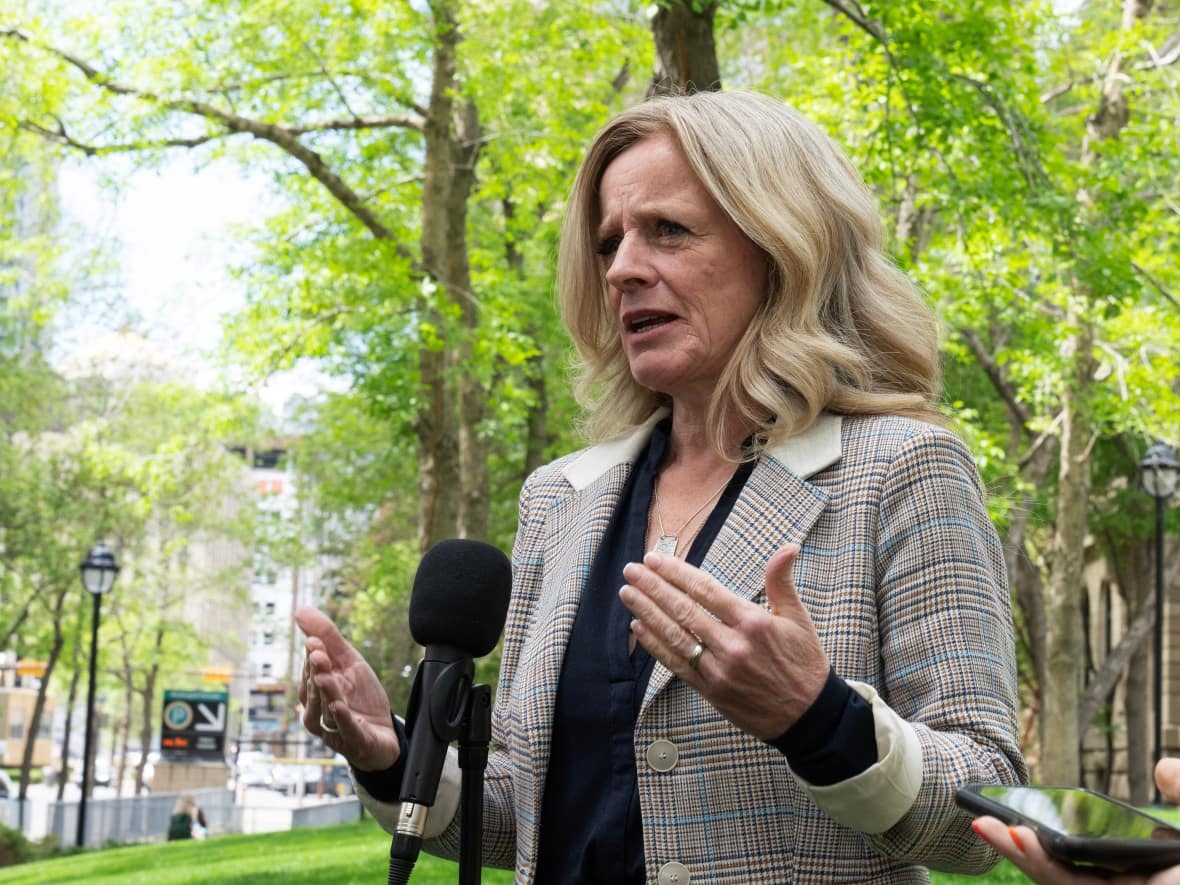Fact check: Will the NDP's plan to raise corporate income tax actually generate $6B in revenue?

Alberta's NDP wants to raise corporate income tax from eight per cent to 11 per cent, claiming that this move will generate just over $6 billion in revenue over three years.
Based on the NDP's cost plan released May 16, the party says this corporate tax rate will generate approximately $1.6 billion from 2023 to 2024, $2.3 billion from 2024 to 2025, and $2.3 billion from 2025 to 2026 — a grand total of roughly $6.2 billion in revenue over the next three years.

However, some aren't convinced that the NDP's math adds up.
Trevor Tombe, a professor of economics at the University of Calgary, says that based on his calculations, the NDP's tax plan seems to only be accounting for the mechanical estimate.
In economics, mechanical estimates are based on the mechanical effect. The mechanical effect is if no one changed their behaviour at all in response to a tax change. This is in contrast to the behavioural effect, where people's behaviour changes in response to a tax change.
"Every single tax increase is going to have both effects," says Tombe.
To break down the mechanical estimates, Alberta's most recent provincial budget projects $5.9 billion in revenue this year from the corporate income tax, valued at $700.5 million per point.
Budget 2023 also projects that corporate income tax will generate $6.3 billion in 2024. Since the corporate tax rate is eight per cent, dividing the revenue by eight shows what each percentage of corporate income tax is worth, which is $782 million.
Multiplying that by three — to reflect the increase from eight to 11 per cent — is how the NDP's corporate income tax revenue for the next three years appears to have been calculated, explains Tombe.

The economist is critical of the NDP's mechanical estimates because these numbers assume that every dollar coming in now with corporate income tax at eight per cent will exist at 11 per cent, too — they don't account for the behavioural effect, for instance, like if such a move should spur some companies to leave the province.
Tombe challenged the NDP's calculations in a Twitter thread where he broke down those calculations. He notes that estimates must account for various factors, which often cuts the mechanical estimate in half.
"The estimates in the NDP platform don't account for some offsetting factors that can be potentially pretty large," he explains.
"There could be a drop in actual investment and therefore activity, there could just be increases in tax shifting to other jurisdictions, or tax avoidance behaviours."
Tombe's Twitter thread of calculations concluded that "instead of raising $2.3 billion, it would more realistically raise somewhere between $1 [billion] and 1.5 billion. That's a lot less than $2.3 billion."
NDP stands by its numbers
When Alberta NDP Leader Rachel Notley was asked about Tombe's calculations, she disagreed.
"First of all, let me just say that other economists have actually countered the statements made [by Tombe] and have actually suggested that our numbers are conservative and reasonable," said Notley during a news conference on Thursday.
"We know that our budget as it stands right now has a solid $1 billion surplus built into it, so we can move forward with our plans even if it takes a bit longer for that revenue to come in."

The party leader said that the NDP have "built a cushion" into the budget. She also added that neither the NDP's nor Tombe's calculations factored in other investments that she believes will stimulate economic growth.
Anupam Das, a professor of economics at Mount Royal University, believes that a corporate tax increase will definitely cause revenues to increase, too.
"I don't think there is any strong evidence that investment is actually that sensitive to corporate taxes," he said.
However, when presented with the NDP's projected revenues and asked about the magnitude, Das didn't feel as though he could speak to the specifics.
On their website, the NDP credits ATB's former chief economist Todd Hirsch as the one helping the party build and navigate their fiscal plan for Alberta, with one of his key recommendations being that the Albertan government "should establish a strong, credible and sustainable financial plan that will guide both revenues and expenditures."
CBC News reached out to Hirsch for an interview on the corporate tax rate, but he declined to comment.

Charles St-Arnaud, chief economist at Alberta Central, the trade association for Alberta's credit unions, says Tombe's calculations come from an informed place. He said that taxes can be a contentious election topic, but it's important to account for nuances.
Responding to the projected revenue included in the NDP's proposal, St-Arnaud says that "it seems big."
"I think that's probably where Trevor's criticism comes from," he said. "We have to be careful, [the NDP's] numbers might not be one for one."
Corporate income tax roller coaster
Tombe says that estimating the impact of this tax increase is difficult — he explains that literature points to it having a "modest negative" impact on employment investment and overall productivity, but "that can be offset depending on what the revenue was used for."
He explains that the NDP's plan for using the revenue to increase spending on public infrastructure such as healthcare, childcare and education can have positive implications for economic growth.
"Even though they might raise fewer dollars — and I strongly believe that they will raise fewer dollars than they report in their platform — they're also not accounting for the benefits that might flow from the childcare and education investments they'll be making with those corporate income tax dollars," explains Tombe.
Currently, Alberta has the lowest general corporate tax rate in Canada, and one of the lowest in North America.
The NDP is correct in stating that, even at 11 per cent, Alberta would still have the lowest corporate income tax rate in the country. However, it would only be half a point lower than Ontario and Quebec, and one full point lower than B.C., Saskatchewan and Manitoba.
Provincial general corporate income tax rates, 2023
Alberta's corporate income tax rate has also been on a wild ride between the New-Democratic and United Conservative governments.
Campaigning on a corporate tax increase isn't new for Alberta's NDP — Notley did this in 2015 and won. During Notley's term as premier, corporate income tax jumped from 10 to 12 per cent. Then, during Jason Kenney's Alberta, corporate income tax decreased to 11 per cent, and then shrunk to eight during the pandemic.
Although history is important, Tombe says we can't rely on it to predict the future.
"Economically, we'll never know the effect of that tax change concretely on investment, employment and economic growth, because it happened at the same time as a massive recession for the province as a result of lower oil prices."

Similarly, he says "we'll also never know the effect of the reduction in the corporate tax rate under the UCP because that was compounded with the shock from the global pandemic."
St-Arnaud agrees, explaining that corporate taxes are not the only element companies consider when making investments or expanding their business within a certain region.
"An example I often give people is, if taxation was such a big issue for businesses, why would Silicon Valley come up with some of the biggest tech companies in the world? California has a very high level of taxes," he notes. "It's the same if we put our corporate taxes to zero — it doesn't mean that suddenly companies will all relocate to Calgary."
Another variable is the province's economic fortunes, which still rely heavily on resource revenues.
According to the Government of Alberta's most recent annual report, the 2021-22 year saw $4.7 billion in revenue from corporate income tax, up $1.7 billion from the year prior and up $2.8 billion from what was estimated in the budget.
But Budget 2023 also states that corporate income tax revenue is "down $0.5 billion from its 2022-23 record level," but remains high.
Differing viewpoints
Again, the NDP's plan for corporate income tax starkly contrasts the UCP's recently announced Bill 1 — the Taxpayer Protection Amendment Act — which would require a referendum before any tax increases.
"The net effect of the whole package is even more difficult to try and pin down," Tombe highlights.
Overall, it's difficult to predict how the NDP's three per cent corporate income tax increase would play out.
Tombe says the UCP's characterization of the corporate tax change as devastating overstates the potential negative impact. However, he also says that if the NDP's estimates are over a billion dollars per year too high, the projected surplus could take a hit, or the province would need to increase its reliance on high oil prices to balance the books.


